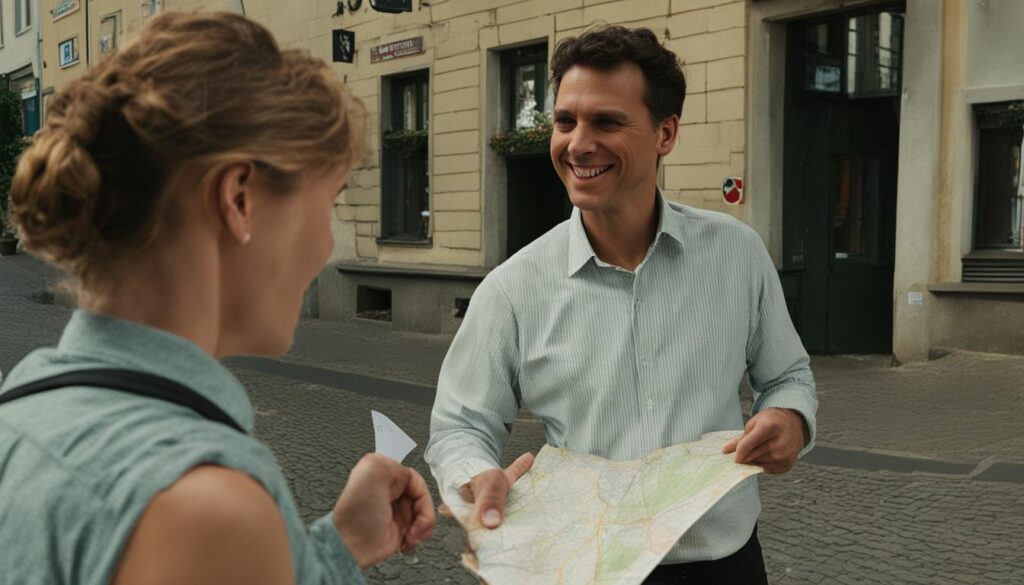If you’re looking to learn German, mastering the basics is essential. In this section, we’ll introduce you to some of the most common German phrases that every beginner should know. These phrases will help you communicate effectively in everyday situations, whether you’re traveling to Germany or simply expanding your language skills.
From greetings and introductions to basic conversational phrases, we’ll cover the essential German phrases you need to know. You’ll also learn how to count in German, ask for help, express gratitude, and navigate common situations like ordering food and asking for directions.
What are some of the most common German phrases I should know? With the phrases in this guide, you’ll be equipped with useful German phrases that will help you engage in conversations and navigate basic situations with confidence. Ready to get started? Let’s dive in.
Greetings and Introductions
As a beginner learning German, mastering everyday German phrases is essential. In this section, we’ll cover some of the must-know German phrases for greetings and introductions. Whether you’re meeting someone new or just passing by, these phrases will help you initiate conversations with confidence.
Basic Greetings
Here are some beginner German phrases to say hello:
| English | German |
|---|---|
| Hello (formal) | Guten Tag |
| Hello (informal) | Hallo |
| Goodbye (formal) | Auf Wiedersehen |
| Goodbye (informal) | Tschüss |
Practice these phrases to become comfortable with greeting people in German.
Introducing Yourself
When meeting someone for the first time, it’s important to introduce yourself. Here are some phrases to help you do so:
- Mein Name ist [Your Name] (My name is [Your Name])
- Ich komme aus [Your Country] (I am from [Your Country])
- Ich spreche kein Deutsch (I don’t speak German)
Use these everyday German phrases to introduce yourself in various settings, such as at a party or in a business meeting.
Asking How Someone Is
You might want to ask someone how they’re doing or feeling. Here are some beginner German phrases to do so:
- Wie geht es Ihnen? (How are you? – formal)
- Wie geht’s? (How are you? – informal)
- Mir geht es gut / schlecht (I am doing well / not doing well)
These phrases are great for starting conversations and showing that you care about the other person.
Now that you’ve learned some basic greetings and introductions in German, try practicing them with native German speakers or with friends who are also learning the language. With these essential German phrases under your belt, you’ll be on your way to becoming fluent in no time.
Basic Conversational Phrases
Now that you’ve mastered some basic German phrases for greetings and introductions, let’s move on to more everyday phrases to help you navigate common conversations.
Here are some popular German phrases that you can use in various situations:
“Wie geht’s?” – This means “How are you?” and is a common greeting in German. You can use it to start a conversation or respond when someone asks you how you’re doing.
“Es freut mich, Sie kennenzulernen.” – This translates to “Nice to meet you.” You can use this phrase when you’re meeting someone for the first time.
“Entschuldigung.” – This means “Excuse me” and can be used to get someone’s attention or apologize for something.
“Ich verstehe nicht.” – This means “I don’t understand” and can be used when you need someone to repeat or explain something.
Here are some basic German phrases that you may find useful in everyday conversations:
| English | German |
|---|---|
| Yes | Ja |
| No | Nein |
| Thank you | Danke |
| You’re welcome | Bitte |
| Excuse me | Entschuldigung |
| Goodbye | Tschüss |
Use these phrases during basic conversations to help you communicate effectively in German.
Now that you have a few basic German phrases, it’s time to start practicing. Try using them in everyday conversations and building on your language skills. With a little bit of practice, you’ll soon be able to speak German with confidence!
Numbers and Counting
As a beginner learning German, it’s important to master the basics of numbers and counting. This will help you understand prices, tell time, and count objects. Here are some essential German phrases for counting:
| Number | German | Pronunciation |
|---|---|---|
| 0 | null | noohl |
| 1 | eins | eyns |
| 2 | zwei | tsvey |
| 3 | drei | dry |
| 4 | vier | feer |
| 5 | fünf | foonz |
| 6 | sechs | zeks |
| 7 | sieben | zeeben |
| 8 | acht | ahkt |
| 9 | neun | noyn |
| 10 | zehn | tsayn |
It’s also important to know how to express larger numbers in German. Here are some essential phrases:
- elf – eleven
- zwölf – twelve
- zwanzig – twenty
- dreißig – thirty
- vierzig – forty
- fünfzig – fifty
- sechzig – sixty
- siebzig – seventy
- achtzig – eighty
- neunzig – ninety
- hundert – one hundred
Practice these phrases regularly to become more comfortable with numbers and counting in German.
Asking for Help
As a beginner, it’s important to know how to ask for help in German. Here are some useful phrases that will come in handy:
Entschuldigen Sie, können Sie mir helfen?
Excuse me, can you help me?
If you’re lost and need directions, you can use these phrases:
Wo ist … ?
Where is … ?
Können Sie mir den Weg zeigen?
Can you show me the way?
If you need medical assistance, use these phrases:
Ich brauche einen Arzt.
I need a doctor.
Ich habe Schmerzen.
I have pain.
If you need help in an emergency, use these phrases:
Rufen Sie die Polizei / Feuerwehr / den Krankenwagen!
Call the police / fire department / ambulance!
Ich brauche Hilfe!
I need help!
Remember, it’s always better to be safe than sorry. Don’t be afraid to ask for help when you need it.
Expressing Gratitude
Showing your appreciation is an essential part of effective communication, and it’s no different in German. Learning how to express gratitude in German is a great way to show respect and build stronger relationships with native speakers. Here are some popular German phrases for expressing gratitude:
Danke – Thank you
Vielen Dank – Many thanks
Danke schön – Thank you very much
Herzlichen Dank – Heartfelt thanks
These phrases work well for any situation where you want to show your appreciation, from receiving a gift to being helped with a task. Remember to use the appropriate formality depending on the situation and the person you’re speaking to. For example, Danke schön is more formal than Danke.
Here’s an example of how to use these phrases in a conversation:
You: Vielen Dank für Ihre Hilfe. (Thank you very much for your help.)
Native speaker: Kein Problem! (No problem!)
You: Ich schätze es sehr. (I really appreciate it.)
Using these phrases will help you become more comfortable with expressing gratitude in German, and show your respect and appreciation to those you interact with.
Basic Survival Phrases
While it’s always best to hope for the best, it’s also important to prepare for the worst. You never know when you might find yourself in a situation where you need to ask for help or communicate an emergency. These basic survival phrases are a must-have for any traveler in Germany.
- “Hilfe!” – Help!
- “Wo ist das Krankenhaus?” – Where is the hospital?
- “Ich habe mich verlaufen.” – I am lost.
- “Ich brauche einen Arzt.” – I need a doctor.
- “Ich habe mein Geld / meine Tasche verloren.” – I have lost my money / my bag.
- “Ich bin in Gefahr.” – I am in danger.
- “Rufen Sie die Polizei!” – Call the police!
Remember, it’s always better to err on the side of caution and seek help if you need it. Don’t be afraid to ask locals or authorities for assistance if you’re unsure of what to do in a difficult situation.
Ordering Food and Drinks
One of the best parts of traveling is experiencing new cuisines. To fully enjoy German food, you’ll need to know how to order in a restaurant. These common German phrases will help you navigate a menu and confidently order food and drinks.
Asking for Recommendations
When you’re unsure what to order, asking for recommendations is always a good option. Use these phrases to ask your server for suggestions:
- “Was empfehlen Sie?” – What do you recommend?
- “Was ist das beliebteste Gericht?” – What is the most popular dish?
- “Welches ist Ihr Lieblingsgericht?” – What is your favorite dish?
By asking for recommendations, you may discover a new favorite dish.
Ordering Food
When you’re ready to order, you’ll need to know how to ask for the specific dish you want. These phrases will come in handy:
| German | English Translation |
|---|---|
| “Ich hätte gerne …” | I would like … |
| “Ich nehme …” | I’ll have … |
| “Könnte ich bitte … haben?” | Can I have … please? |
| “Ich bestelle …” | I’ll order … |
Be sure to use the correct article (der, die, das) when referring to the dish you want.
Ordering Drinks
Don’t forget to order something to drink with your meal! Here are some useful phrases:
| German | English Translation |
|---|---|
| “Ich hätte gerne Wasser.” | I would like water. |
| “Ein Bier, bitte.” | A beer, please. |
| “Könnten wir die Getränkekarte sehen?” | Could we see the drink menu? |
If you want tap water, ask for “Leitungswasser.”
Requesting the Bill
When you’re finished eating, it’s time to pay. These phrases will help you request the bill:
- “Könnten wir bitte zahlen?” – Could we pay, please?
- “Die Rechnung, bitte.” – The bill, please.
It’s common to split the bill in Germany, so don’t be surprised if your server asks if you want separate bills.
Now that you know how to order food and drinks in German, you can enjoy delicious cuisine without any language barriers. Guten Appetit!
Shopping and Negotiating Prices
When traveling to Germany, you’ll want to know how to shop and negotiate prices. Here are some beginner German phrases, important German phrases, and useful German phrases to help you get started:
Asking for the Price
Before making any purchases, you’ll need to know how much things cost. Here are some phrases to help you ask for the price:
| English | German |
|---|---|
| How much does this cost? | Wie viel kostet das? |
| What’s the price? | Was kostet das? |
| Is it expensive? | Ist das teuer? |
Bargaining
In some places, bargaining is expected. Here are some phrases to help you negotiate prices:
| English | German |
|---|---|
| Can you lower the price? | Können Sie den Preis senken? |
| Is that the best price? | Ist das der beste Preis? |
| What’s your final price? | Was ist Ihr letzter Preis? |
Expressing Your Preferences
When shopping, it’s helpful to be able to express your preferences. Here are some phrases to help you do that:
| English | German |
|---|---|
| I’m looking for something specific. | Ich suche etwas Bestimmtes. |
| Do you have this in another color/size? | Haben Sie das in einer anderen Farbe/Größe? |
| I prefer this one. | Ich bevorzuge dieses hier. |
Remember, when shopping and negotiating prices in Germany, it’s important to be polite and respectful.
Asking for Directions
Getting lost in a foreign country can be stressful, but with these useful German phrases, you’ll be able to ask for directions with confidence.
Asking for Help
If you’re lost and need assistance, these simple phrases will come in handy:
| English | German |
|---|---|
| Excuse me, can you help me? | Entschuldigung, können Sie mir helfen? |
| I’m lost, can you show me on a map? | Ich habe mich verlaufen, können Sie es mir auf einer Karte zeigen? |
| Where is the nearest…? | Wo ist das nächste…? |
| How do I get to…? | Wie komme ich zu…? |
Understanding Directions
Once you’ve asked for directions, make sure you understand the response with these important phrases:
| English | German |
|---|---|
| Excuse me, I didn’t understand. Can you repeat that? | Entschuldigung, ich habe das nicht verstanden. Können Sie das bitte wiederholen? |
| Turn left/right. | Biegen Sie links/rechts ab. |
| It’s straight ahead. | Es geht geradeaus. |
| It’s on the left/right. | Es ist auf der linken/rechten Seite. |
Talking about the Weather
Engaging in small talk is an important part of everyday life in Germany. Discussing the weather is a common topic, and it’s a great way to make conversation with locals. Here are some basic German phrases to help you talk about the weather:
Wie ist das Wetter heute?
What’s the weather like today?
Es ist sonnig / bewölkt / regnerisch / schneereich.
It’s sunny / cloudy / rainy / snowy.
Es ist zu kalt / zu heiß.
It’s too cold / too hot.
Use these phrases to describe the weather and start a conversation. You could say something like:
Heute ist es wirklich sonnig, nicht wahr?
It’s really sunny today, isn’t it?
Or:
Es ist so kalt draußen! Ich hoffe, es wird bald wärmer.
It’s so cold outside! I hope it gets warmer soon.
Keep in mind that the weather can vary greatly depending on where you are in Germany. For example, the northern part of the country tends to be cooler and rainier, while the southern part can be warmer and sunnier. As you travel around, pay attention to the weather and how locals talk about it.
In summary, discussing the weather is a great way to start a conversation in Germany. Practice these basic phrases and use them to engage with locals. Viel Glück!
Conclusion
Congratulations on completing this guide to mastering the basics of common German phrases! You are now equipped with essential language skills that will help you navigate basic conversations, express yourself, and understand important information while communicating in German.
Remember to keep practicing and expanding your vocabulary to become even more proficient in the language. Learning German phrases can be challenging, but with dedication and persistence, you can achieve your language goals.
Don’t forget to use the SEO relevant keywords, such as common German phrases, learn German phrases, and essential German phrases, to continue enhancing your language skills. And most importantly, have fun with it! Learning a new language can be a rewarding and enriching experience.
















































